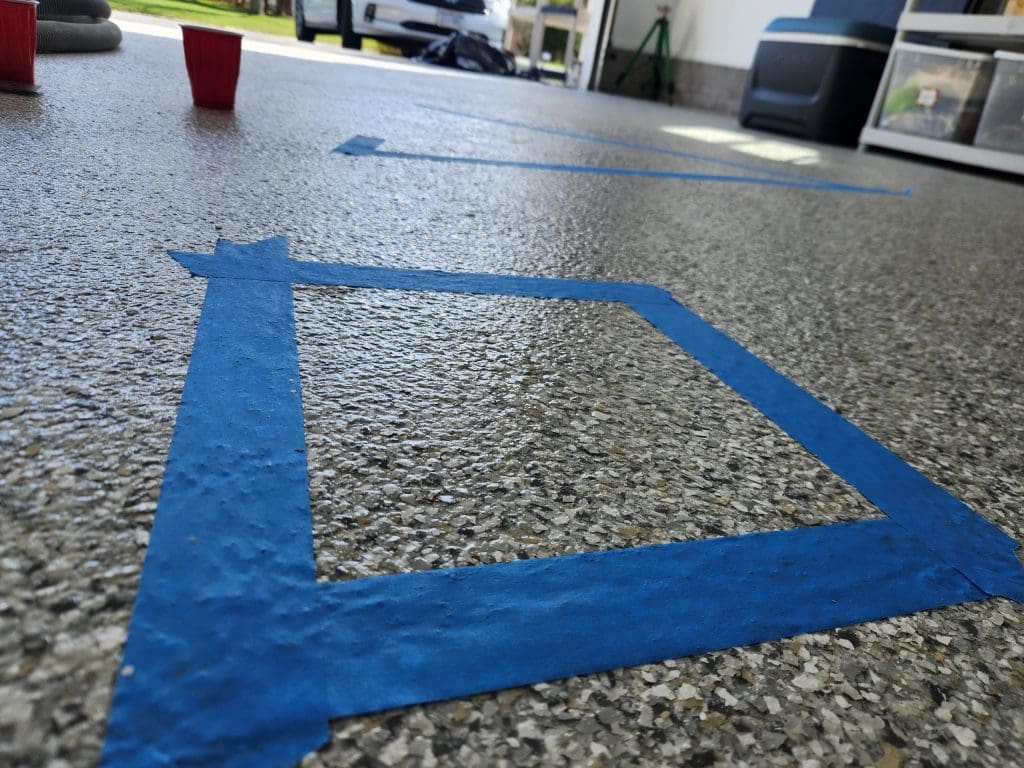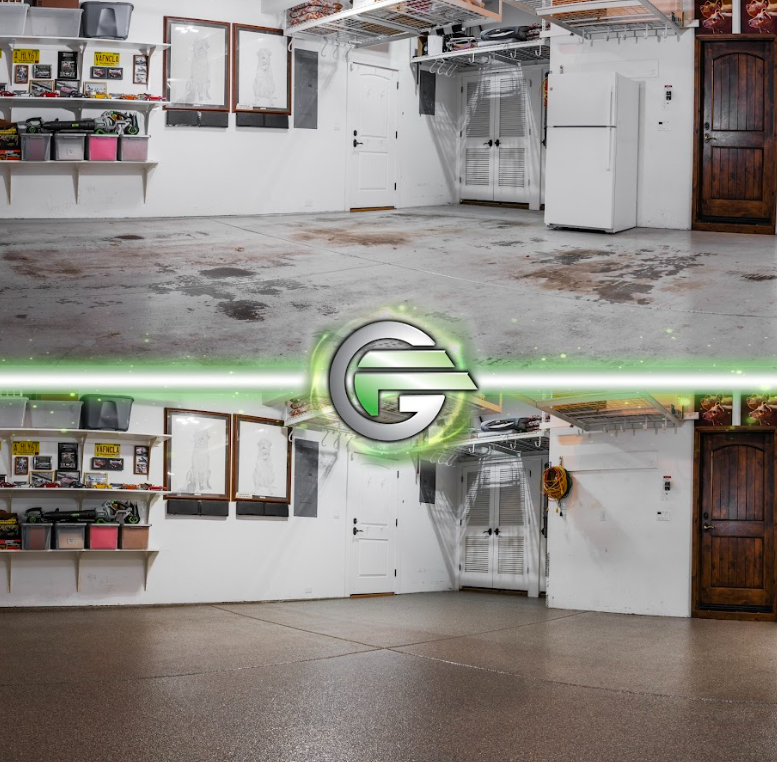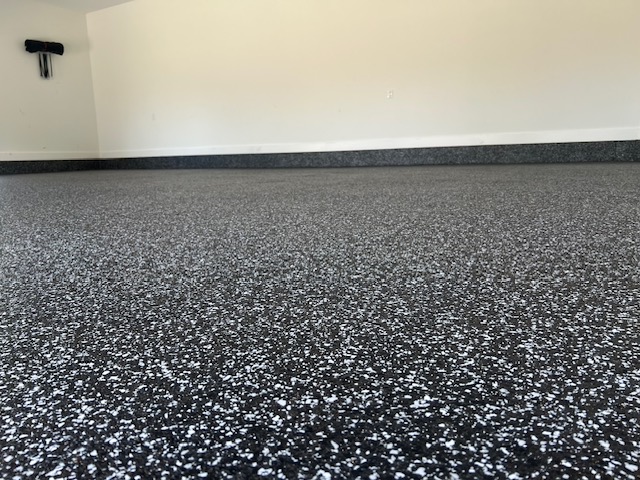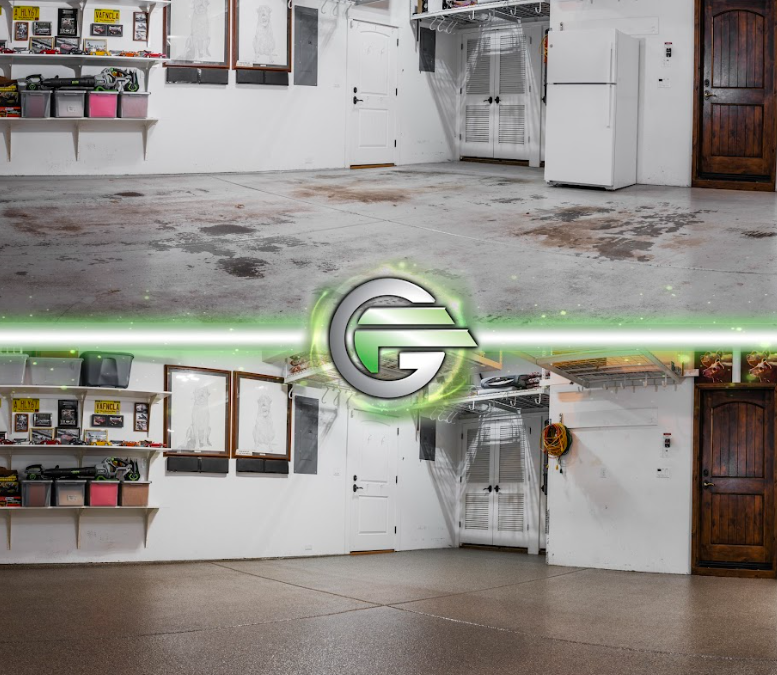Concrete coatings play a crucial role in enhancing the durability, aesthetics, and functionality of concrete surfaces. Whether you’re considering a concrete coating for your driveway, patio, or garage floor, understanding the different types of coatings available and their respective benefits is essential. One key benefit of these coatings is their extremely durable nature, making them capable of withstanding varying temperatures, large weights, impact, and UV exposure, thus ensuring a long-lasting solution for various applications. In this comprehensive guide, we’ll delve deeper into the world of concrete coating options, answering common questions and providing valuable insights to help you make informed decisions for your projects. Specifically, we will answer these frequently asked questions:
- Can you put a coating over concrete?
- What is a concrete coating?
- What is the best coating for concrete?
- What is a concrete coating?
- How long do concrete coatings last?
- Is concrete coating better than epoxy?
- Can you put a coating over concrete?
- What is a good top coat for concrete?
- What is the longest lasting concrete coating?
CAN YOU PUT A COATING OVER CONCRETE?
Yes, applying a coating over a concrete surface is a common practice in the construction and renovation industry. Coatings serve as protective layers that shield concrete from various elements such as moisture, chemicals, UV rays, and physical damage. Whether you’re dealing with a newly poured concrete slab or an existing surface that requires refurbishment, applying a coating can enhance its appearance and extend its lifespan.
Coatings can be applied to a wide range of concrete structures, including floors, walls, countertops, and outdoor surfaces. They offer versatility in terms of aesthetics, allowing you to choose from a variety of colors, textures, and finishes to achieve the desired look for your project. A quality concrete coating also creates an air of elegance and adds to the environment of a given area, whether that is a basement bar, a garage floor, an industrial warehouse, or anywhere else.

WHAT IS A CONCRETE COATING?
A concrete coating is a specialized material applied to concrete to provide protection, enhance aesthetics, and improve functionality. These coatings are designed to adhere to the porous surface of concrete, forming a strong bond that resists peeling, flaking, and delamination. Concrete coating solutions come in various forms, including epoxy, polyurethane, acrylic, and sealers, each offering unique benefits and applications.
Epoxy coatings, for example, are composed of epoxy resins and hardeners that chemically react to form a durable and resilient surface. Epoxy is known for its’ exceptional strength, chemical resistance, customizable aesthetics, and superior abrasion resistance, making it suitable for a wide range of residential, commercial, and industrial applications. Additionally, metallic epoxy coatings can be used to achieve a unique marble-type look, enhancing the visual appeal of the surface.
Polyurea coatings, on the contrary, are engineered with polyurea polymers that offer unparalleled durability and resilience. Renowned for their exceptional resistance to abrasion, impact, and chemical exposure, polyurea coatings surpass traditional alternatives in demanding environments. Ideal for outdoor applications subjected to harsh conditions, such as garage floors, industrial facilities, and outdoor decks, polyurea coatings provide unmatched protection and longevity. Moreover, polyurea coatings offer versatility in finishes, ranging from textured and slip-resistant to glossy and decorative, allowing for customization to suit specific aesthetic preferences. With their rapid cure times and seamless application, polyurea coatings offer swift and efficient solutions for enhancing the durability and performance of concrete floors.
WHAT IS THE BEST COATING FOR CONCRETE GARAGE FLOORS?
Determining the best coating for concrete depends on various factors, including the intended use of the surface, environmental conditions, and desired aesthetics. While epoxy coatings were once widely regarded as one of the top choices for concrete flooring due to their exceptional durability and versatility in enhancing longevity, reducing wear and tear, increasing water resistance, decreasing maintenance, and providing an attractive polished finish, other options such as polyurethane, acrylic, and sealers may offer other unique or higher quality features.
Epoxy coatings are favored for their ability to create a seamless and impervious surface that resists stains, abrasion, and chemical damage. They are commonly used in high-traffic areas such as garage floors, workshops, and industrial facilities where durability and performance are important.
Polyurea coatings, conversely, are renowned for their unmatched durability, resistance to UV radiation, and stunning high-gloss finish. Polyurea coatings elevate both the appearance and resilience of concrete surfaces. They excel in outdoor settings exposed to the elements, enduring sunlight, precipitation, and fluctuating temperatures with ease. Polyurea coatings offer not only superior protection against water and UV damage but also aesthetic enhancement, ensuring both functionality and visual appeal.
Sealers are clear coatings that penetrate into the pores of concrete to provide protection against water, oil, and other contaminants. They are easy to apply and maintain, making them suitable for both indoor and outdoor concrete surfaces.
Ultimately, the best coating for your concrete project will depend on your specific requirements and preferences. Consulting with a professional contractor or coating specialist can help you choose the right product for your needs and ensure proper application for optimal results.

Ultimately, the best coating for your concrete project will depend on your specific requirements and preferences. Consulting with a professional contractor or coating specialist can help you choose the right product for your needs and ensure proper application for optimal results.
How long do concrete coatings last?
The lifespan of concrete coatings can vary depending on several factors, including the type of coating used, the quality of concrete surface preparation, and the level of wear and tear. Generally, well-applied epoxy coatings can be expected to last anywhere from 2 to 10 years or more with proper maintenance and care.
Polyurea coatings, for example, are known for their long-lasting durability and can withstand heavy foot traffic, vehicle traffic, and chemical exposure. With regular cleaning and occasional reapplication of protective sealants, a polyurea coating can maintain its appearance and performance for many more years than traditional epoxy alternatives.
Polyurethane coatings offer similar longevity and can provide durable protection against abrasion, UV damage, and moisture intrusion. However, exposure to harsh chemicals or extreme weather conditions may require more frequent maintenance to ensure optimal performance.
Acrylic coatings and sealers typically have a shorter lifespan compared to epoxy and polyurethane coatings but can still provide several years of protection with proper care. Routine maintenance such as cleaning, resealing, and spot repairs can help extend the lifespan of acrylic coatings and sealers and keep concrete surfaces looking their best.
It’s important to note that the lifespan of concrete coatings can be influenced by factors such as climate, usage patterns, and maintenance practices. Harsh environmental conditions, heavy traffic, and improper maintenance can accelerate wear and tear on coatings, leading to premature failure.
Is concrete coating better than epoxy coatings?
Concrete coating isn’t a type of floor coating in and of itself. Polyurea coatings stand out as the superior choice when it comes to concrete coatings. While epoxy coatings are renowned for their exceptional durability, chemical resistance, and customizable aesthetics, polyurea coatings offer unparalleled performance and longevity. Unlike epoxy coatings, which create a seamless surface, polyurea coatings form an impermeable barrier that resists stains, abrasion, and impact damage with unmatched efficacy. This makes polyurea coatings the ideal solution for high-traffic areas like garages, warehouses, and commercial facilities where durability is paramount.
Additionally, polyurea coatings boast exceptional adhesion to various substrates, including concrete, metal, and wood, ensuring a strong and enduring bond that enhances the longevity of the surface. It’s crucial to highlight that achieving the best results with polyurea coatings significantly depends on properly prepared surfaces. This preparation involves careful cleaning, grinding, or acid etching to ensure excellent adhesion and bond strength, which is essential for long-lasting and durable results.
Moreover, the versatility of polyurea coatings is unmatched, with a wide range of colors, textures, and finishes available to suit any aesthetic preference.
Furthermore, polyurea coatings require minimal maintenance, making them an excellent long-term investment for property owners. In summary, while other concrete coatings may offer benefits in specific areas, polyurea coatings reign supreme in terms of durability, performance, and longevity, making them the ultimate choice for demanding environments.
What is a good top coat for concrete?
When it comes to selecting a topcoat for concrete surfaces, incorporating a primer coat is a crucial initial step, especially when using a fast-setting polyaspartic floor coating system. This base coat is essential for enhanced adhesion and durability, laying the foundation for a seamless and long-lasting finish. Following the primer, applying thin coats is recommended to achieve an even and durable finish, particularly with polyurea coatings. These coatings are highly recommended for their excellent durability, resistance to abrasion, and UV protection, providing a glossy finish that enhances the appearance of concrete surfaces while offering long-lasting protection against wear and tear. Overall, polyurea coatings are highly resistant to a wide variety of temperatures and conditions.
In addition to polyurea coatings, epoxies can also be used as topcoats to provide additional protection and enhance the appearance of concrete surfaces. Epoxy topcoats offer excellent adhesion and durability, making them suitable for applications where heavy-duty protection is required. The application of thin coats is also beneficial when using acrylic sealers, ensuring the sealer is breathable, fast drying, and resistant to abrasion.
When selecting a topcoat for your concrete project, it’s essential to consider factors such as surface preparation, environmental conditions, and intended use. Consulting with professional contractors or coating specialists can help you choose the right product and ensure proper application for optimal results.
What is the most abrasion resistant, longest lasting concrete coating?
While the longevity of concrete coatings can vary depending on factors such as maintenance and environmental conditions, polyurea coatings are renowned for their exceptional durability and longevity. Polyurea coatings are a type of spray-applied coating that forms a seamless and impermeable barrier over concrete surfaces, providing superior protection against abrasion, chemicals, and UV exposure. Notably, their UV resistant properties contribute significantly to their longevity, especially in outdoor applications where they prevent yellowing and maintain their appearance over time.
Polyurea coatings offer several advantages over traditional coatings, including rapid cure times, high tensile strength, and flexibility. They can be applied in a wide range of temperatures and humidity levels, making them suitable for both indoor and outdoor applications. Polyurea coatings also exhibit excellent adhesion to concrete substrates, ensuring long-lasting performance even in harsh environments.
One of the key benefits of polyurea coatings is their resistance to moisture, making them ideal for applications such as garage floors, basements, and outdoor decks where water intrusion is a concern. Unlike epoxy and polyurethane coatings, polyurea coatings are not prone to yellowing or discoloration when exposed to UV radiation, ensuring a durable and attractive finish that stands the test of time.
In addition to their longevity, polyurea coatings offer fast turnaround times, allowing for quick installation and minimal downtime. Whether you’re renovating a commercial facility, upgrading a residential garage, or protecting an outdoor patio, polyurea coatings provide a cost-effective solution for long-lasting durability and performance.

In Conclusion
In conclusion, choosing the right coating for your concrete surfaces is essential for enhancing durability, aesthetics, and functionality. Whether you opt for epoxy, polyurethane, polyurea, or another type of coating, proper surface preparation and application are crucial for achieving optimal results. By understanding the different types of coatings available and their respective benefits, you can make an informed decision that suits your specific needs and preferences.
For professional assistance with concrete coating installation or to learn more about our services, contact Garage Force today!


Recent Comments